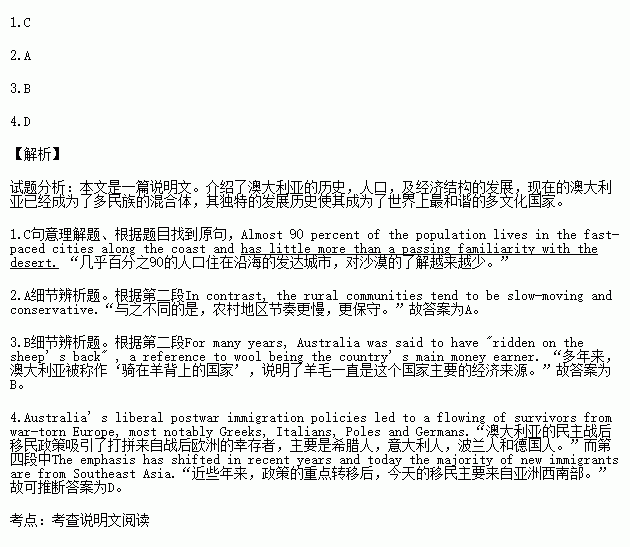题目内容
Considering Australia' s size and the fact that early settlements were far apart, Australian society is remarkably homogeneous ( 同种的). Its citizens are fundamentally prosperous and the way of life in the major cities and towns is much the same however many miles divide them. It takes a sharp ear to identify regional accents.
However, there is some difference in lifestyle between city settlers and the country people. Almost 90 percent of the population lives in the fast-paced cities along the coast and has little more than a passing familiarity with the desert. The major cities preserve images of colonial heritage, but the overall impression is modem, with new buildings reflecting the country' s youth. In contrast, the rural communities tend to be slow-moving and conservative. For many years, Australia was said to have "ridden on the sheep' s back" , a reference to wool being the country' s main money earner. However, it is no longer dominant ( 主宰的) . Much of Australia' s relatively sound economy is now achieved from natural coal and wheat, and by being the largest diamond producer in the world. Newer industries such as tourism and wine making are also increasingly important. Australians are generally friendly and relaxed, with a modest sense of humor.
Yet, contrary to widespread belief, very few Australians have true prisoner origins. Within only one generation of the arrival of the First Fleet in 1788, Australia had become a nation of immigrants. Originally coming almost entirely from the British Isles, today one in three Australians comes from elsewhere. Australia' s liberal postwar immigration policies led to a flowing of survivors from war-torn Europe, most notably Greeks, Italians, Poles and Germans.
The emphasis has shifted in recent years and today the majority of new immigrants are from Southeast Asia. Today Australia is a "mixture of nations" and although some racism exists, it has generally been a successful experiment and the country is reasonably proud to have one of the most harmonious multicultural communities in the world.
1. What does the writer mean by saying "has little more than a passing familiarity with the desert" in the second paragraph?
A. The major population has a close relationship with the desert.
B. The fast-paced cities are just located by the desert.
C. The major population knows little about the desert.
D. The major population is familiar with the people living in the desert.
2. Which of the following statements is TRUE according to the passage?
A. The pace of life in the city is different from that in the country.
B. One third of people living in Australia come from Europe.
C. The Australian economy is dependent on sheep exports.
D. Most Australians have ancestors who were prisoners.
3. What used to be Australia' s main money earner?
A. Wheat. B. Wool. C. Tourism. D. Diamond.
4. We can infer from the passage that ____.
A. nothing about Australia' s colonial part in modem cities can be seen by visitors
B. tourism and wine making resulted in fast development in rural communities only
C. immigrants from Europe have brought racial problems
D. Australia' s recent immigration policy encourages immigrants from Southeast Asia
There are some strange driving laws in different countries.
Countries | Laws |
Vietnam | If you’re in Vietnam without a Vietnamese driver’s license, you risk a prison sentence of up to three years. |
Russia | In Moscow, if your car is dirty enough to draw dust art, you will be fined about 2,000 rubles (about US $55). Worse yet, it’s illegal to wash your car by hand in public places — forcing you to take it to one of the few car wash facilities. |
Thailand | Drivers —male or female — can’t drive shirtless, whether it’s a car, a bus, or a tuk-tuk cab. |
France | France requires its drivers to carry a portable breathalyzer(酒精测量仪) at all times when driving a car. The one-time breathalyzer cost around US$5, and if you don’t have one, you will be fined US$15. |
Cyprus | Raising your hands in the car can get you fined of US$35. The law states a driver can be fined if the person “is in an irregular position inside the car or raises his hand from the steering wheel unnecessarily. |
Japan | Politeness isn’t just the culture in Japan; it’s part of driving laws. Splashing a person by driving through a puddle(水坑) with your car will cost you over US$60. The country is also strict with its DUI(酒驾) laws — riding with or lending your car to a driver who gets caught drinking and driving can lead to a fine costing thousands of dollars. |
1.Where should you go to wash your car when you are in Moscow?
A. The car wash facilities.
B. Any public place
C. Your home
D. The forest
2.What can get you fined for in Cyprus?
A. Forgetting to carry a portable breathalyzer.
B. Not having a Cyprus driver’s license.
C. Putting your hands above your head when you are driving.
D. Driving without a shirt.
3.If you are fined thousands of dollars in Japan, you may have been ____.
A. in an irregular position in your car
B. sitting in a car with a drunk driver
C. splashing a person with mud
D. impolite to other drivers
4.This text can most likely be found in _______.
A. a law document
B. a fashion magazine
C. an international newspaper
D. a column on interesting cultures

